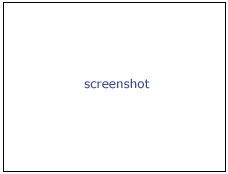Difference between revisions of "Modules:IA FEMesh-Documentation-3.6"
(Created page with 'Return to Slicer 3.6 Documentation Gallery of New Features __NOTOC__ ===IA_FEMesh=== IA-FEMesh {| |[[Image:screens…') |
|||
| Line 29: | Line 29: | ||
===Module Description=== | ===Module Description=== | ||
| − | + | This module allows the creation and editing of volumetric meshes. Polygonal surfaces in VTK or STL format are imported to begin the process. Then a unique and intuitive bounding surface (called Building Blocks) are created interactively by the user and used to guide automated meshing algorithms. The module includes visualization and analysis reports of the quality of mesh elements. Meshes can be written out in Abaqus or VTK format for later processing. | |
== Usage == | == Usage == | ||
Revision as of 13:49, 25 March 2010
Home < Modules:IA FEMesh-Documentation-3.6Return to Slicer 3.6 Documentation
IA_FEMesh
IA-FEMesh
General Information
Module Type & Category
Type: Interactive
Category: Wizard
Authors, Collaborators & Contact
- Nicole Grosland: The University of Iowa - Affiliation & logo, if desired
- Vincent Magnotta: The University of Iowa - Affiliation & logo, if desired
- Kiran Shivanna: The University of Iowa - Affiliation & logo, if desired
- Steve Pieper: Affiliation & logo, if desired
- Curt Lisle: KnowledgeViz
- Contact: Nicole Grosland (grosland at engineering dot uiowa dot edu) or Vincent Magnotta (vincent-magnotta at uiowa dot edu)
Module Description
This module allows the creation and editing of volumetric meshes. Polygonal surfaces in VTK or STL format are imported to begin the process. Then a unique and intuitive bounding surface (called Building Blocks) are created interactively by the user and used to guide automated meshing algorithms. The module includes visualization and analysis reports of the quality of mesh elements. Meshes can be written out in Abaqus or VTK format for later processing.
Usage
Use Cases, Examples
This module is especially appropriate for these use cases:
- Use Case 1:
- Use Case 2:
Examples of the module in use:
- Example 1
- Example 2
Tutorials
Links to tutorials explaining how to use this module:
- Tutorial 1
- Data Set 1
Quick Tour of Features and Use
A list panels in the interface, their features, what they mean, and how to use them. For instance:
|
Development
Notes from the Developer(s)
Algorithms used, library classes depended upon, use cases, etc.
Dependencies
Other modules or packages that are required for this module's use.
Tests
On the Dashboard, these tests verify that the module is working on various platforms:
- MyModuleTest1 MyModuleTest1.cxx
- MyModuleTest2 MyModuleTest2.cxx
Known bugs
Links to known bugs in the Slicer3 bug tracker
Usability issues
Follow this link to the Slicer3 bug tracker. Please select the usability issue category when browsing or contributing.
Source code & documentation
Links to the module's source code:
Source code:
Doxygen documentation:
More Information
Acknowledgment
Include funding and other support here.
References
Publications related to this module go here. Links to pdfs would be useful.

